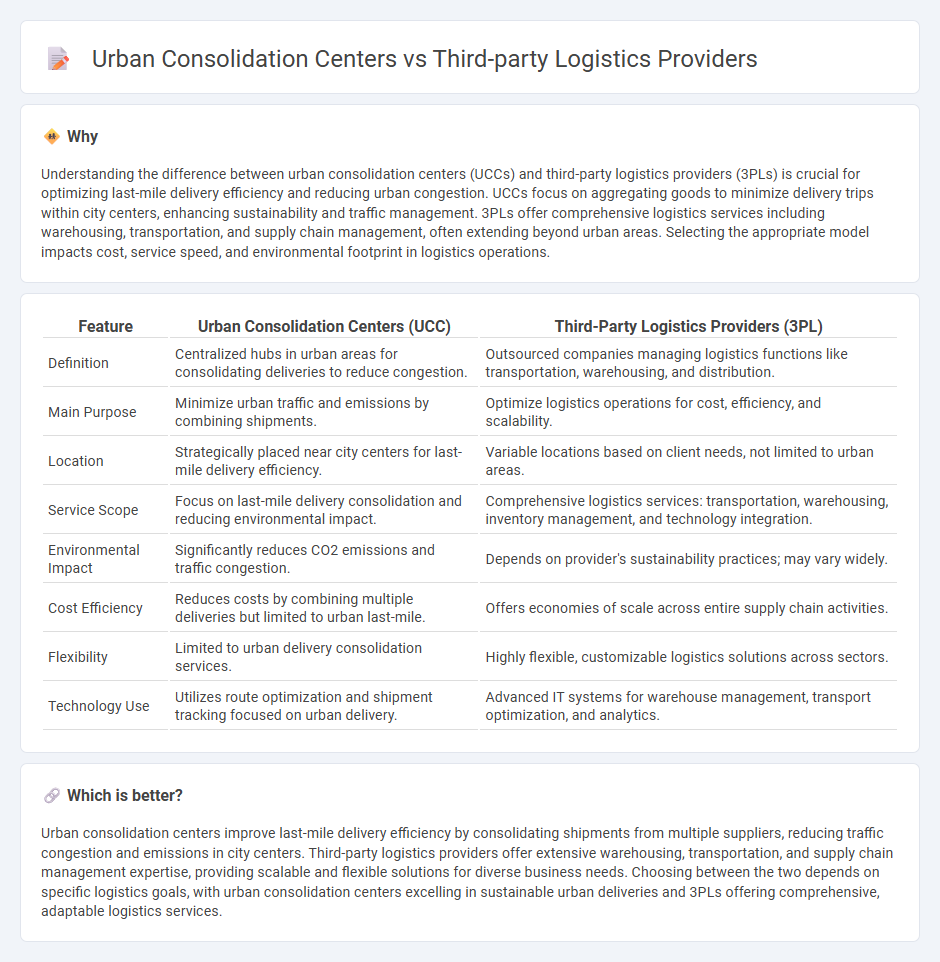
Urban consolidation centers streamline last-mile delivery by centralizing shipments, reducing traffic congestion and emissions in dense city areas. Third-party logistics providers offer comprehensive supply chain solutions, including warehousing, transportation, and distribution across various regions. Explore how each approach enhances efficiency and sustainability in modern urban logistics.
Why it is important
Understanding the difference between urban consolidation centers (UCCs) and third-party logistics providers (3PLs) is crucial for optimizing last-mile delivery efficiency and reducing urban congestion. UCCs focus on aggregating goods to minimize delivery trips within city centers, enhancing sustainability and traffic management. 3PLs offer comprehensive logistics services including warehousing, transportation, and supply chain management, often extending beyond urban areas. Selecting the appropriate model impacts cost, service speed, and environmental footprint in logistics operations.
Comparison Table
| Feature | Urban Consolidation Centers (UCC) | Third-Party Logistics Providers (3PL) |
|---|---|---|
| Definition | Centralized hubs in urban areas for consolidating deliveries to reduce congestion. | Outsourced companies managing logistics functions like transportation, warehousing, and distribution. |
| Main Purpose | Minimize urban traffic and emissions by combining shipments. | Optimize logistics operations for cost, efficiency, and scalability. |
| Location | Strategically placed near city centers for last-mile delivery efficiency. | Variable locations based on client needs, not limited to urban areas. |
| Service Scope | Focus on last-mile delivery consolidation and reducing environmental impact. | Comprehensive logistics services: transportation, warehousing, inventory management, and technology integration. |
| Environmental Impact | Significantly reduces CO2 emissions and traffic congestion. | Depends on provider's sustainability practices; may vary widely. |
| Cost Efficiency | Reduces costs by combining multiple deliveries but limited to urban last-mile. | Offers economies of scale across entire supply chain activities. |
| Flexibility | Limited to urban delivery consolidation services. | Highly flexible, customizable logistics solutions across sectors. |
| Technology Use | Utilizes route optimization and shipment tracking focused on urban delivery. | Advanced IT systems for warehouse management, transport optimization, and analytics. |
Which is better?
Urban consolidation centers improve last-mile delivery efficiency by consolidating shipments from multiple suppliers, reducing traffic congestion and emissions in city centers. Third-party logistics providers offer extensive warehousing, transportation, and supply chain management expertise, providing scalable and flexible solutions for diverse business needs. Choosing between the two depends on specific logistics goals, with urban consolidation centers excelling in sustainable urban deliveries and 3PLs offering comprehensive, adaptable logistics services.
Connection
Urban consolidation centers streamline the delivery process by aggregating shipments from multiple retailers into a single, centralized location, which third-party logistics providers utilize to enhance last-mile delivery efficiency. Third-party logistics providers coordinate with these centers to reduce traffic congestion, lower delivery costs, and improve environmental sustainability in dense urban areas. This integration supports optimized route planning and resource allocation, resulting in faster, more reliable urban logistics operations.
Key Terms
**Third-Party Logistics Providers:**
Third-party logistics providers (3PLs) offer comprehensive supply chain solutions including transportation, warehousing, and inventory management, enabling businesses to outsource logistics operations for enhanced efficiency and cost savings. These providers leverage advanced technology and extensive networks to optimize delivery routes and reduce transit times, benefiting companies with scalable and flexible logistics capabilities. Explore how partnering with 3PLs can transform your logistics strategy and boost operational performance.
Outsourcing
Third-party logistics providers (3PLs) offer comprehensive outsourcing solutions that optimize supply chain management through warehousing, transportation, and distribution services. Urban consolidation centers (UCCs) focus on consolidating shipments within city limits to reduce traffic congestion and lower emissions, often serving as a sustainable last-mile delivery strategy for businesses outsourcing urban logistics. Explore these models further to determine which outsourcing approach best fits your urban logistics needs.
Freight Management
Third-party logistics providers (3PLs) specialize in managing freight transportation, warehousing, and distribution, offering scalable solutions that optimize supply chain efficiency. Urban consolidation centers (UCCs) reduce freight traffic in congested city areas by consolidating shipments for last-mile delivery, enhancing sustainability and reducing costs. Explore how integrating 3PL services with UCC strategies can revolutionize urban freight management and improve overall logistics performance.
Source and External Links
18 Third Party Logistics (3PL) Companies to Know | Built In - Third party logistics companies (3PLs) provide services such as distribution, warehousing, fulfillment, and shipping on behalf of businesses, managing technology-driven operations like order tracking and inventory analytics in a booming global market worth over $1 trillion as of 2022.
3PLs, Explained: The Complete Guide to Third-Party Logistics - RXO - A third-party logistics company handles multiple supply chain functions like brokering, shipping, storing, or packing freight, helping businesses outsource these tasks to improve efficiency, expertise, and reduce costs, with many 3PLs operating as non-asset-based providers coordinating logistics services.
How 3PLs Revolutionize Logistics and Supply Chain Management - 3PL providers offer a range of logistics services including transportation, warehousing, inventory management, order fulfillment, and customs brokerage, serving as intermediaries between businesses and customers to streamline operations and enhance supply chain performance through specialized knowledge and technology.
 dowidth.com
dowidth.com